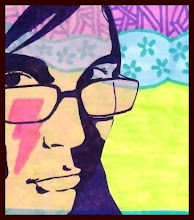
I really liked this novel. Quite a lot. In fact, I would have given it 5 of 5 stars if a. I wasn't trying to be more discerning with my rating system, reserving 5's for only those novels I consider all-time favorites b. if the third and final portion of the book hadn't dragged on a bit too long. That is my only real criticism of the book, that that third part of the book is a bit too long... because the rest is pure gold.
Some people seem dissuaded by this book because it is highly regarded as the ultimate postmodern novel. And it is, really. If you have any experience with postmodern theory then there are about 10-20 different paper topics one could make from this book alone. Believe me, I did one of them in a single frenzied Sunday afternoon sitting at an IHOP during finals. It was about Hitler as a simulacrum. And I got an A, because as I said, this is rich postmodern reading, and White Noise is great fodder for any professor who loves himself a good postmodern analysis. Just mention "the most photographed barn in America" and you'll get any postmodern theorist worked up into a frenzy.
But even if you could not give less of a crap about postmodernism (and I'm sure there are plenty of you out there), this is still a great novel. Because at the crux of this novel are two themes we can all identify with: the meaning of and dissipation of the nuclear family and the fear of death. And it's put together in this witty (if sometimes hard to access) package that is genuinely a pleasure to read.
This particular version that I read was the 25th anniversary edition with an introduction by Richard Powers. Normally, I regard most introductions as either boring rehashings of plot points I want to experience for myself or monotonous statements of the most obvious, but I actually liked this introduction. It was a nice precursor to some of the novels themes and even if some of the points he makes are a bit obvious, they're useful. It sets up the novel well.
This is my third DeLillo novel, and I can see why it is regarded as his very best, even if personally I liked Libra just a bit more. DeLillo is a writer whose sense of irony and well-placed word play makes his writing seem alive and vibrant, pulsating and electric, even where the plot seemingly lags. His characters are composites of people who are so distinctly absurd that you know they probably do exist somewhere, absurdity aside. I would readily recommend this book to anyone interested in contemporary literature, and especially to students of literary theory.
That's the mark of this book's quality: you can read it for theory or you can read it for pleasure, and either reading would be equally enriching.
This review was reposted and expanded from my review at Good Reads. Oh, you love reading and reviewing books, too? Join! We can be friends!




No comments:
Post a Comment